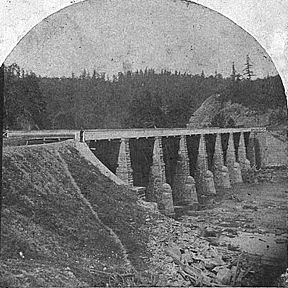Genesee Valley Canal facts for kids
Quick facts for kids Genesee Valley Canal |
|
|---|---|

Aqueduct in Portageville, New York over the Genesee River
|
|
| Specifications | |
| Length | 124 miles (200 km) |
| Locks | 106 |
| Status | closed |
| History | |
| Original owner | New York State |
| Date of first use | September 1, 1840 |
| Date completed | 1862 |
| Date closed | September 30, 1878 |
| Geography | |
| Start point | Erie Canal in Rochester, New York |
| End point | Allegheny River near Olean, New York |
| Branch(es) | Dansville branch |
The Genesee Valley Canal was a waterway in central New York State. It was used for boats from 1840 to 1878. This canal was 124 miles long and had 106 locks. Locks are like water elevators that help boats move up and down hills. Later, a railroad used its path. Today, parts of the old canal are now a walking and biking trail called the Genesee Valley Greenway.
Contents
Building the Genesee Valley Canal
In the early 1800s, many people moved to the Genesee River area. They grew crops like wheat on the rich farmland. Farmers needed a way to send their crops to Rochester. But the Genesee River had waterfalls, making it hard for boats to travel. So, people wanted a canal!
On May 6, 1836, the New York State government decided to build the Genesee Valley Canal. It would start from the Erie Canal in Rochester. Then, it would go south along the Genesee River valley. It would pass through towns like Mount Morris, Portageville, and Belfast. Finally, it would reach the Allegheny River near Olean. There was also a branch that went to Dansville.
How the Canal Was Built
Building the canal was a big job! The canal needed a lot of water to work. A large reservoir held 68 million cubic feet of water. This water was carried to the highest part of the canal by a special feeder creek. In total, 13 feeder creeks supplied water to the Genesee Valley Canal.
One important area was near Ischua. The Ischua Creek flowed into the Allegheny River. This made Ischua a perfect spot to build a dam and use the water. Building the canal through Ischua and Hinsdale helped merchants move goods all the way from Rochester to Pittsburgh.
One of the hardest parts was getting past the deep Portage Falls gorge. This area is now part of Letchworth State Park. To solve this, builders created a huge aqueduct. This bridge was 400 feet long and stood 50 feet above the Genesee River. It was a major engineering feat!
When the Canal Opened
The first part of the canal opened on September 1, 1840. Boats could now travel from Rochester to Mount Morris. The branch to Dansville opened in the fall of 1841.
The entire canal, all the way to Olean on the Allegheny River, was open by 1862. However, by this time, new railroads were being built. These railroads made it easier and faster to transport goods. The Allegheny River also wasn't always deep enough for large boats, only in spring when water levels were high. Even so, the canal continued to operate for a while.
Why the Canal Closed
Railroads became more popular and efficient. So, on June 4, 1877, the New York State government decided to close the canal. It officially stopped operating on September 30, 1878. The canal was then sold to a railroad company called the Genesee Valley Canal Railroad on November 6, 1880.
What's Left of the Canal Today
The canal is no longer there, but its path lives on! Much of the old canal route is now part of the Genesee Valley Greenway. This is a long trail perfect for walking, biking, and enjoying nature.
You can still see some parts of the old canal. For example, remnants of the Ischua Dam can be visited at the Town of Ischua Historical Society and Park. In Hinsdale, the local VFW post has highlighted parts of the old lock system. These are near the end of the canal in Cattaraugus County.
Cuba Lake was also created because of the canal. It was built in 1858 to help keep the canal's water levels steady. Today, Cuba Lake is owned by New York State. People can lease land around the lake for cottages and homes.
 | Audre Lorde |
 | John Berry Meachum |
 | Ferdinand Lee Barnett |


